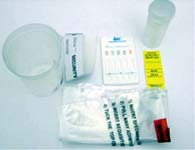Timely
Intervention
Helps
Block
Student
Drug
Testing:
The
Case
of
Oregon's
Lebanon
Community
School
District
8/27/04
With the Labor Day weekend almost upon us, millions of American kids are heading back to school. A small percentage of them will face drug testing programs at their schools, part of an ongoing youth anti-drug effort reenergized by the Bush administration with its call this year for more funding for schools to implement those programs. While the school board in Lebanon, Oregon, was poised to have its local schools join the ranks of those testing students for drugs, it ultimately decided against that course of action. A timely intervention by a staff member of the Students for Sensible Drug Policy (http://www.ssdp.org) national office played a critical role in that decision.
With an eye toward replicating the positive outcome in Lebanon in other school districts that may consider implementing a drug testing program for students, DRCNet decided to take a closer look at what happened with the Lebanon Community School District. The board began considering implementing a drug testing policy over the summer, but the battle heated up this month. In early August, the board was considering two policies, one to test athletes and the other to test students involved in extracurricular activities at the beginning of the year, but there was also sentiment on the board to push for a policy of random drug testing of those students year round. The drug testing program would have been based on a model program drafted by the Oregon School Boards Association. The association creates model policies to guide local school boards on any number of education-related issues, said spokeswoman Shannon Priem. "Our policy department keeps sample policies so boards can consider adopting them," she told DRCNet. The drug testing model policy was updated after last year's Supreme Court decision to let districts know that testing could now include students involved in extracurricular activities, she said. But that doesn't mean the association endorses drug testing, Priem said. "We are merely helping boards stay abreast of the law. All the decisions are made locally, and we just help them know what the law is," she said. While Priem said that the association did not track the number of districts in the state with drug testing programs, it is believed to be small. (The Monitoring the Future annual surveys of student drug use last year estimated that only 5% of school districts nationwide have suspicionless drug testing programs.) "Each student wishing to participate in athletics [and/or extracurricular activities] and the student's parent(s) shall consent in writing to drug testing. No student shall be allowed to participate in athletics [and/or extracurricular activities] without that consent," says the model policy. Under the model policy, students testing positive for drugs for the first time will be given the option of attending a drug treatment program or being barred from extracurricular activities. Subsequent offenses under the model policy earn an automatic ineligibility for extracurricular activities. In all cases, the student and his parents must meet with the principal. The model policy does not mention law enforcement. One board member, Dr. William Barish, criticized the proposed policies early on, telling a local newspaper drug tests were really idiot tests -- only an idiot would take drugs when he knew he was going to be tested, said Barish. When that local press report came across the desk of SSDP legislative director Ross Wilson at the national office in Washington, Wilson sprang into action.
And thus a crucial connection was made. "I provided arguments about why drug testing doesn't work and how it could actually exacerbate existing drug problems," said Wilson. "But it was the Monitoring the Future study that found drug testing did not deter drug use that really got him interested." That study reported: "Drug testing of students in schools does not deter drug use. The research findings challenge the premise that has been central to the rationale for schools adopting a drug testing policy." According to the researchers, investigators found "virtually identical" drug use rates at schools that tested and schools that don't. The finding hold true across grade levels, the research found. "We think that one reason so few schools test their students is that it is an expensive undertaking," said lead Monitoring the Future researcher Lloyd Johnston. "Schools are very pressed for funds, and I would say the results of our investigation raise a serious question about whether drug testing is a wise investment of their scarce resources. It's also very controversial with parents and students," he pointed out. "The way that drug testing has been carried out in the schools looks very unpromising. I have no doubt that one could design a drug testing program that would deter teen drug use, but at what monetary cost and at what cost in terms of intrusion into the privacy of our young people?" "We managed to open a dialogue with Barish," Wilson continued. "He asked for more information, saying he needed more ammunition for his arguments at the board. With our help, Barish went from someone with doubts about drug testing to almost an activist against it." Unfortunately, Barish was away on vacation this week and unavailable for comment, but school board chair Tom McHill confirmed to DRCNet that Barish played the key role in mobilizing opposition to a district drug testing program. "Dr. Barish was very important in questioning the cost and effectiveness of a drug testing program," McHill said. Those concerns eventually killed the plan, at least for now, he added. And while the Oregon School Boards Association says it is not advocating drug testing, McHill told DRCNet it was the association's model policy that first stirred the board's interest. "We have a longstanding policy of using the summer months to consider policies generated by the Oregon School Boards Association, so we were considering enacting drug testing for athletes or students participating in extracurricular activities." But with the help of SSDP, Barish raised enough doubts to kill the proposal -- at least for this year. "Our administration has been fairly aggressive in ensuring that kids violating school policies get appropriate punishments, but when it comes to drug testing, the board decided that we need to find out where we are and what our problems really are, so we've instructed the administration to come back and tell us what is currently being done district-wide," said McHill. "I personally wasn't sure drug testing was the best way to deal with this, and Dr. Barish was questioning not only the cost of the policy, but what we are really trying to achieve here. Are we trying to discourage drug use or just catch kids in a way that is not helpful?" Given all those concerns, the board voted not to adopt a drug testing policy at this time, McHill said. "We want to make sure we're doing the best job we can, and we're not ready to take that step right now." Lebanon, Oregon, students will be drug test-free for at least another year, and SSDP's Wilson is looking for more school boards to influence. "School board members I've talked to are not ideologues; they have their hearts in the right place and just want their students to stay away from drugs and drug addiction. It has been my experience that they are open to new ideas, and they want to hear why it's a bad idea even if they support it," he said. "School board members sometimes tell me that even if drug testing doesn't work, they implement it to be able to say they were doing something about the problem. I respond by telling them there are smart, productive things you can do that actually work, like taking that money and hiring a substance abuse counselor, training parents how to talk about drugs with their kids, or even working with the PTA." Kudos to the Lebanon Community School District for taking a level-headed approach to the issue -- and to SSDP's Wilson, not only for helping one school district make the right decision, but also for reminding us all what a little direct communication can achieve.
|


